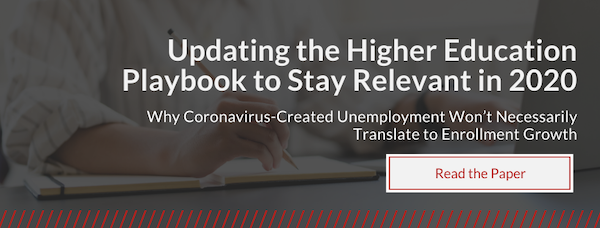Published on
The Future of Instruction: Dividing Semesters in Half

In response to the pandemic, course structures have been disrupted and possibly forever changed for future instruction. Higher education is reshaping traditional models, and shorter courses may be the answer to retaining students as we head into this new normal. In this interview, Eric Boynton discusses the benefit of these courses for both learners, the institution, and the challenges that come with it.
The EvoLLLution (Evo): How can learners benefit from shorter course lengths?
Eric Boynton (EB): The pandemic and social distancing regulations disrupted the lives of millions of college students by forcing a fast pivot to online classes. While this measure was absolutely critical to stopping the spread of COVID-19, the move has impacted college students nationwide and posed challenges for an educational mission built on transformational pedagogical strategies.
The unpredictability of the pandemic also meant that we had to examine different options for the fall. We need to plan in case we can’t return to campus, or if a second wave of COVID-19 hits us. We knew we needed to respond to the many struggling students faced with online learning and to maintain their confidence in an institution dedicated to their well-being and future success.
In response, Beloit College launched a ground-breaking plan that ensures a seamless migration from in-person to online and vice versa. First, the semester will start two weeks later than normal, and we’ll be splitting each semester in the academic year in half. Students will take two courses during the first half and then two more in the second. Each half is seven-and-a-half weeks long. This plan, called Mods, makes the move to online learning more adaptable for full-time college students. Additionally, it also minimizes disruption if a change between in-person and remote instruction has to happen mid-semester.
For example, if an outbreak occurs at the beginning of the fall semester, students will have the ability to take two courses online with the possibility of returning to campus for in-person classes during the second half of the semester.
Evo: How does the college benefit from offering a wider range of short courses?
EB: The move to distance learning was a challenge, not only for students but for educators. A recent survey showed that most institutions were not optimally prepared to “flip a switch” and move all learning to a fully online setting.
With the launch of our new course structure, the college has found a flexible way to support the migration to online learning, if needed, because only two courses instead of the traditional four are impacted.
We all know that in-person relationships and opportunities for teaching and mentoring make up the core of a Beloit College experience. Still, some of our students will be unable to be physically on campus for the first and perhaps second Mod. Those students will need to access online courses to continue their academic progress. Additionally, some faculty and staff who teach may have reasonable concerns about returning to the classroom in September even with protective practices in place. The college is offering them the option of teaching and continuing rich interactions with students online for one or both Mods in the fall term.
Given our plan’s flexibility and its support of both students and faculty needs, it’s not surprising that our plan received overwhelming buy-in and support from Beloit College faculty and staff, allowing us to roll out the new course structure in a matter of days. Over 20 other institutions are now implementing plans similar to ours.
Evo: What impact do you expect shortening courses to have on learning outcomes?
EB: Not only does the change in our course structure respond to COVID-19, but it also allows our students to engage in other life-changing experiences that contribute to their collegiate experience and better prepare them for the future.
A recent survey found that only 41% of college students feel prepared for their future careers. As a leading liberal arts institution, we want the college experience to be pragmatic by broadening students’ visions of the future and building tangible connections between campus and career.
Moving forward with the Mods course structure opens the door for students to gain relevant educational experience beyond the classroom, including internships, field experiences, off-campus opportunities, alumni mentorships, student organizations. As a result, our graduates will be more confident, resourceful and employable.
Evo: Broadly speaking, how do you expect offering short courses to impact the way learners engage and interact with the institution?
EB: When we began looking at different options for the fall semester, we imagined that an entire semester online would not be fully embraced by our students. In fact, a recent survey showed that only 29% of students prefer this option, and 57% of students would switch schools if only online instruction was offered.
The feedback regarding this innovation has been overwhelmingly positive, especially since the new structure is more adaptable. In addition, students now have peace of mind knowing what to expect for the upcoming semester, despite the overwhelming uncertainty surrounding COVID-19.
The new course structure also minimizes the contact that traditionally comes from taking four or more classes at a time and permits research classes and labs in particular to meet for an extended amount of time. Faculty can delve more deeply into a subject and spend more time with each student.
This crisis has also provided an opportunity for Beloit College to think outside the box and develop innovative solutions that best serve our students’ needs. By thinking critically, we have been able to implement initiatives that positively impact the way learners engage and interact with our institution.
In addition to the Mods course structure, another initiative developed at Beloit is our innovative Advanced Mentoring Program, which provides comprehensive guidance and support to students during their first two years at Beloit College. Within 72 hours of students making their deposit, we assign them a faculty advisor who welcomes them into the community, shares helpful resources and walks them through the ins-and-outs of the collegiate experience.
A college like Beloit understands its educational mission as an investment in the whole person aimed at individual transformation. This kind of potent preparation for a complex and evolving world requires a profound commitment to the social, intellectual, and personal well-being and development of our students that happens inside and outside of the classroom. This kind of labor-intensive undertaking goes far beyond content delivery; it is about connections, relationships, and community. No matter the form the fall semester takes for different Beloit students, connections, relationships and communities, it will catalyze the relevance of our world-class, rigorous education. And Mods is the way to successfully navigate what the world throws at us.
Evo: What are some of the operational challenges you’re anticipating when it comes to delivering responsive, flexible offerings that don’t align with the semester schedule?
EB: Our institution was an early adopter of a new course structure for the upcoming academic calendar year, so this transition has been fairly seamless.
It’s also important to note that Beloit College developed this idea back in 2015 but opted not to implement it at that time. The public health crisis caused by the coronavirus presented an urgent opportunity to put the idea into action. As a result, students have been able to sign up for courses easily, and faculty are creating a robust teaching schedule for hybrid educational scenarios in the next academic year.
We also want our students to be involved as we develop plans for a return to campus that prioritizes protective health practices and supports a community of faculty, students and staff dedicated to caring for themselves and others. We’ve been hosting meetings with key student leaders to develop pragmatic rules and guidelines that allow students to enjoy the campus experience in new community-focused ways this fall. These students are helping implement various measures for social events and everyday aspects of student life.
We know that online learning is different from the in-person experience; however, our core values of relationships, community and connection will find expression regardless of whether we convene classes and community in person or from a distance this fall.
This interview was edited for length and clarity.




